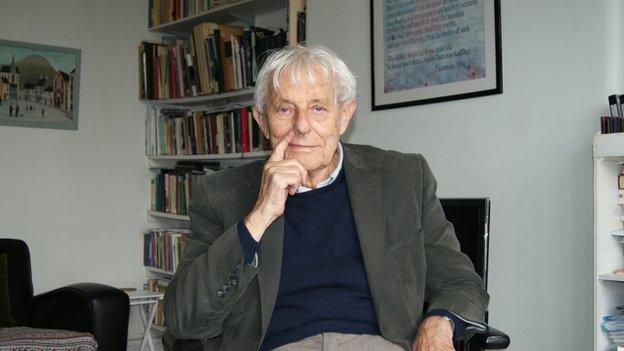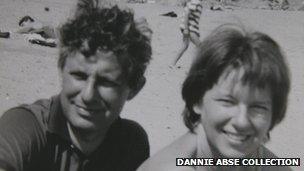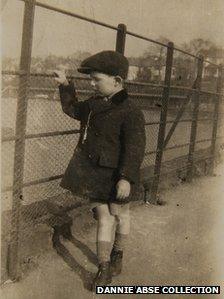Dannie Abse: Cardiff-born poet reflects on his career as he turns 90
- Published

Abse in the study of his London home where since 1957 he has written most of his work
Dannie Abse sums up his experience of getting old in typically poetic style.
"In the mildew of old age all pavements slope uphill and lead to an exit, alas," he says with a wry smile across his face.
As he prepares to turn 90 on Sunday, the Cardiff-born writer is paraphrasing the opening of Talking To Myself, a poem from his most recent collection Speak, Old Parrot.
It was published earlier this year and, after seven decades, he has hinted it may be his last.
"The 'Parrot' is a sort of inspirational self," explains Abse.
"The last poem in (the book) is called Gone? and it suggests that the parrot is not going to speak to me anymore.
"My editor said it was very pessimistic. So I said, well, put a question mark after it."
Favourite curry house

Abse was injured and his wife Joan killed in a car crash in 2005
In the year when Ireland lost Seamus Heaney, it is fitting that the elder statesman of Anglo-Welsh poetry will be feted in a number of events in his native land.
Again in typical Abse style, one will be at his favourite Vale of Glamorgan curry house. "They did it when I was 80," he recalls, "and I gather they are doing it again this year, so I'll be down."
For the majority of his life Abse has lived in north London, but insists he still feels Welsh.
"Yes, I still feel connected," he says. "I listen to the Radio Wales news in the evenings. There's still a house, my house, in Ogmore-by-Sea."
'Philistine city'
One of four children born to Jewish parents, Abse grew up in pre-war Cardiff, attending St Illtyd's Catholic High School. He drew atmospherically on this period in his acclaimed 1954 novel Ash On A Young Man's Sleeve.
The Cardiff of his youth was, he says, quite different to the one he now visits: "Cardiff has changed, of course it has, but for the better.
"It was a Philistine city when I was a young man. Now you've got bookshops, theatre, opera. It's a great city to live in. If I was young I'd love to.
"I always wanted to live in Cardiff but my job was here and it was a job that suited me."
For 30 years as a doctor in a chest clinic, Abse combined his literary career with his medical one.
'Spiritual X-rays'
He first showed his poems to others at medical school and his first volume, After Every Green Thing, was published in 1948.
Gradually his medical experiences worked their way into his poems, which he has described as "spiritual X-rays".
But it is clear, despite "certain small satisfactions", which career has been the more rewarding.
"Poets tend to have too much empathy for people," says Abse, "and for doctors too much empathy, and too much identification with the patient, that's bad for the patient.
"That's why I don't think doctors...make better writers than they do doctors."
As a writer Abse has shared the stage with many of his more celebrated contemporaries.
Awkward encounter
He toured Macedonia with Heaney, gave readings with Laurie Lee, lunched with Stephen Spender and once received a letter from his "acquaintance" Poet Laureate Ted Hughes apologising for being overly influenced by one of Abse's poems.
Dannie Abse describes his bizarre meeting with the legendary poet Dylan Thomas in a London pub
Abse also endured an awkward painful encounter in a London pub with Dylan Thomas in which the latter mischievously confused him with his own cousin.
Mixing with fellow writers was, he says, "pleasure-giving and instructive" but he will not be drawn on which he most admired.
"If I say somebody I'll omit other people and I like quite a lot of them," he says. "I like a lot of their poems even when I don't like all of their poetry."
After 50 years of marriage to art historian Joan Mercer, Abse's life took a shocking turn in June 2005 when he was injured and she was killed in a car crash on the M4 in south Wales.
At 81 the writer found himself coming to terms with the loss, something he says he still has not entirely managed to do.
"I miss my wife. Continually," he says.
'Difficult'
After the crash Abse took to writing down his thoughts in a diary which he was persuaded to publish in 2007 as The Presence, winning the Arts Council of Wales Book of the Year Award.

Abse as a boy in Roath Park, Cardiff
He also updated his autobiography, Goodbye Twentieth Century.
"It was quite difficult me turning to that scene, because that car accident flashes into my mind from time to time, still.
"It happens to pass, for me, that particular moment, quite often.
"However it's eight years now and I did meet (writer) Lynne Hjelmgaard five years ago, and we have a relationship which I'm very comforted by. I hope she is too."
Asked about the compensations of old age, Abse falls back on a family saying.
"My mother used to say: 'Every age has its compensations, son'. I'm not so sure there are too many compensations when you are 90. But people do stand up for you when you're in the Tube and people are kind to you.
"And I think fellow poets are particularly kind to one, you know. They can see the hearse around the corner, so there's no more rivalry."
- Published31 December 2011